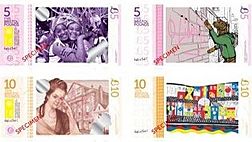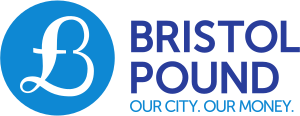Bristol pound facts for kids
Quick facts for kids Bristol pound |
|||
|---|---|---|---|
|
|||
| User(s) | Bristol | ||
| Symbol | £B | ||
| Plural | Bristol pounds | ||
| Banknotes | |||
| Freq. used | £B1, £B5, £B10, £B20 | ||
The Bristol pound (£B) was a special kind of money used in Bristol, UK. It was launched on September 19, 2012. Its main goal was to encourage people to spend their money at local, independent shops and businesses in Bristol. This also encouraged those businesses to buy their own supplies from other local places.
The digital version of the Bristol pound stopped working in August 2020. After that, Bristol pound accounts changed back to regular British pounds at the Bristol Credit Union. The group behind the Bristol pound is now working on a new project called Bristol Pay. This new system aims to help people pay each other easily and raise money for good causes in the city. It also wants to change how people think about money, focusing on social and environmental value.
The paper Bristol pound notes could be used until September 30, 2021. However, because of the COVID-19 pandemic, new paper notes were no longer being printed to help stop the spread of germs. You can still find souvenir notes on the Bristol pound website.
Contents
What Was the Bristol Pound?
The Bristol pound was a local or community currency. It was created to "improve Bristol's local economy." Its main purpose was to support independent shops and businesses. This helped keep a wide variety of businesses in the city. The project was a joint effort between the Bristol Pound Community Interest Company and Bristol Credit Union.
Before the Bristol pound, other local currencies were started in the UK. These included ones in Totnes (2006), Lewes (2008), Brixton (2009), and Stroud (2010).
Why Local Money Matters
How Local Money Helps
When you spend money at a local shop, that money can stay in the local area. For example, the shop owner might use it to buy supplies from another local business. Or they might pay local taxes to the city council. This process can happen many times, keeping the money circulating within the local economy. This idea is called the local multiplier effect. It means that spending money locally can create more economic benefits for the area.
In contrast, when you spend regular British pounds at a large supermarket chain, most of that money often leaves the local area very quickly.
Using local money can also make communities stronger. It can help people feel more connected to where they live. Buying local goods can also reduce pollution because products don't need to travel as far. Local trade can also help a community be more prepared for big economic problems. It makes the area less dependent on national or international trade.
What Research Showed
In 2017, a local newspaper, the Bristol Post, reported on some research. This research suggested that the Bristol pound project was too small to make a huge difference. It also said it hadn't greatly increased local wealth or production. However, a spokesperson for the Bristol Pound said these findings were different from earlier research by the University of Bristol.
How People Used It
Bristol was the first city in the UK where you could pay taxes and business rates using a local currency. People who had a Bristol pound account could change their Bristol pounds to regular British pounds, and vice versa, at the same value (1:1).
Bristol City Council and other groups in the city allowed their employees to receive some of their salaries in Bristol pounds. The former Mayor of Bristol, George Ferguson, even took his entire salary in Bristol pounds!
From June 2015, you could pay energy bills in Bristol pounds to Good Energy, a company that uses 100% renewable energy. The CEO of Good Energy said this was the first time in the world you could pay energy bills with a local currency.
In June 2015, about £1 million in Bristol pounds had been created. More than £B700,000 was still being used. Over 800 businesses accepted Bristol pounds, and more than a thousand people had Bristol pound accounts.
By late 2017, five million Bristol pounds had been spent. However, around this time, fewer people started using the currency. In March 2020, the Bristol Post reported that the currency's future was uncertain. But as of April 2021, the Bristol Pound group is still working. They are focused on creating new money and token systems. Their goal is to help build a local economy that is good for the environment, fair for everyone, and strong enough to handle big problems.
Who Ran the Bristol Pound?
The Bristol pound was managed by a non-profit group called the Bristol Pound Community Interest Company. They worked with the Bristol Credit Union, a local financial group. The Bristol Credit Union made sure that for every paper Bristol pound printed, one British pound was kept safely in a special fund.
Bristol City Council also supported the project. However, the council reduced its financial support from 2018 onwards.
The Bristol pound was part of a bigger international movement of local currencies. They were involved in a project called Digipay4Growth. This project helped the Bristol pound make its currency digital, using special software.
The Bristol pound group also helped start the Guild of Independent Currencies in the UK. This was a way for different local currency groups to share their experiences. This group later became the Independent Money Alliance. Through this, the Bristol pound group helped other cities, like Exeter, launch their own local money, the Exeter Pound. Even though this formal group no longer exists, the Bristol pound group still works closely with other similar groups around the world.
Using the Bristol Pound
The Bristol pound could be used as both paper money and electronic money, just like regular money. One Bristol pound was always worth one British pound. Some businesses even offered discounts if you paid with Bristol pounds. You could also pay local taxes and electricity bills online using Bristol pounds.
Paper Bristol Pounds
Anyone could use paper Bristol pounds. They were designed by people from Bristol and had many security features to stop fake notes. New paper notes were printed in June 2015. You could exchange them for British pounds at 17 different places in the city. You could also order them online from the Bristol pound website.
Electronic Payments
The Bristol pound was one of the first local money systems in the UK to allow electronic payments. This meant that small businesses could accept payments using SMS (text messages). They didn't need to buy or install a credit card machine. Businesses were later charged a small fee (1%) for payments made by SMS. This was often cheaper than fees for credit cards or PayPal. You could also make payments online. The person receiving the payment was charged 1%, but this fee was capped at 95p per transaction.
Is It Legal?
Every paper Bristol pound was backed up by £1 British pound kept at the Bristol Credit Union. The Bristol pound was not legal tender. This means that businesses didn't have to accept it, but they chose to. The people running the scheme couldn't stop big national or international companies from accepting paper Bristol pounds. However, they could decide which businesses were allowed to open a Bristol pound account and trade electronically.
You could only change Bristol pounds back into British pounds through an electronic Bristol pound account. There was no fee for this. You couldn't directly change paper Bristol pounds back to British pounds without putting them into an electronic account first. The paper notes were technically like vouchers. The first notes even had an expiry date (September 30, 2015). The Bank of England knew about local currencies and understood their role.
Awards
The Bristol pound helped Bristol win the title of European Green Capital in 2015.
See also
- Bank Charter Act 1844
- Cyclos
- Community Currency
- Local Currency
- Exeter pound
- New Economics Foundation
- Brixton Pound
- Lewes pound
- Monero
- Stroud pound
- Totnes pound
- BerkShares
- Scrip
Images for kids
 | Claudette Colvin |
 | Myrlie Evers-Williams |
 | Alberta Odell Jones |



